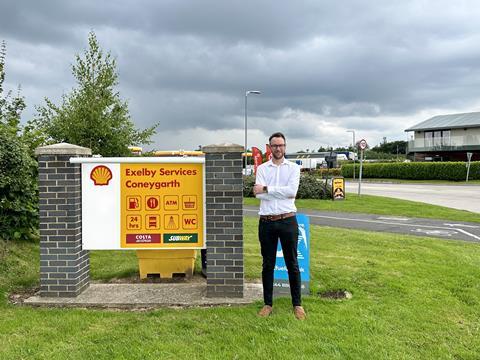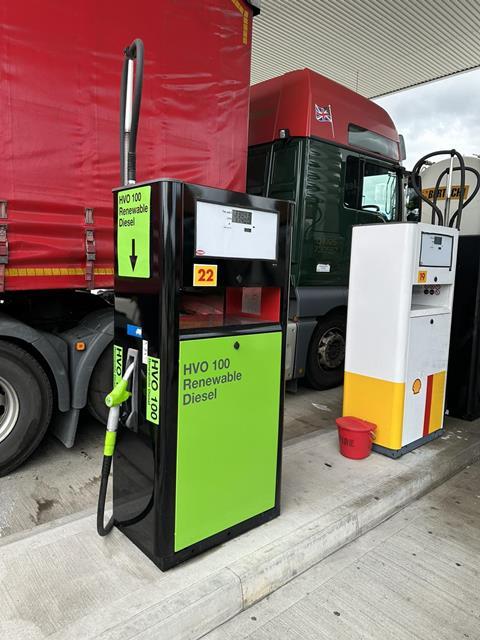
Clean fuel trailblazer Rob Exelby plans to introduce EV charging by the end of September in a trial with Shell where he will invest £450,000 to purchase the chargepoints and connect them to the grid. In return, he will retain most of the revenue.
Under what he describes as a proof of concept business model, he will be the first dealer to purchase the Shell Recharge-branded units, as well as spending £250,000 for the grid connection. And, he says, if the pilot is successful at his Exelby Services’ Coneygarth forecourt, at Northallerton, North Yorkshire, others could come on board.
Rob, who runs five service station/truckstops in the north of England, hit the headlines with a partnership with hydrogen refuelling specialist Element 2 in 2022, in which he planned to become the first business to introduce public HGV refuelling stations with the alternative fuel. He secured planning permission for two of his sites on main haulage routes in 2023 – at Coneygarth on the A1(M) and at Carlisle on the M6. Building work is due to start this year.
He has also introduced hydrotreated vegetable oil (HVO) on pumps – branded HVO 100 Renewable Diesel – at three of his sites at the end of last year: Coneygarth on the A1(M) and the northbound and southbound sites on the A19 at Teesside. Coneygarth, the site which has most take-up, sells around 8,000 litres of HVO a month.

Initially, Rob is installing four twinpoint 200kW chargepoints, at a cost of £200,000, and could potentially increase this to 15 to 20 units at Coneygarth. Shell, he says, will take a small fixed percentage per kilowatt cut of the charging turnover to cover branding, merchant service fees, and Shell Recharge app costs. And, he says, there is potential to upgrade the power of the Alpitronic units to 400kW if there is demand.
”I have been wanting to do something with EV for years and years and have talked to many suppliers. I’m glad I waited, as five years ago the conversation was around 30kW and 50kW and the rate of progression of electric vehicles and charging has increased so much that had I taken the plunge then the equipment would be obselete. I think it is safe to make the investment now as development of batteries and charging capability appears to have matured,” said Rob.
“Up until now, Shell would cover the cost of the infrastructure, groundworks and equipment and would give the forecourt operator a pence per kilowatt small kickback rate. It is not the way that we like to do business. If we believe in a product or service we like to be a big part of it,” he added.
“This is a very new model, and we will be the guinea pigs to embark on what will be a learning curve for both parties.”
The charging bays at the 24-hour Coneygarth site will be near the shop and amenities, with Rob extending the car parking area. To take advantage of the food to go potential coming from EV charging he is introducing a Stone Willys hot food counter, complementing the existing Subway and in-house diner kitchen, in a shop refit at the end of this year.
He says that people charging their cars could use the gym, which he is extending primarily for truck drivers, following a Department for Transport grant for improving the site’s services for hauliers.
”You never know, people spending half an hour charging their car just might want to spend 30 minutes on the treadmill,” said Rob.
If all goes to plan then Rob could introduce Shell Recharge points at his site in Carlisle early next year.
Getting sufficient grid access could be problematic though, says Rob, who received a quote for over £2 million for his forecourt on the A19 southbound to get connection.
“We would like to roll this out elsewhere and are fighting distribution network operators for additional sites, although access to improved grid capacity at some will be too expensive,” he said. “It is time for us to get behind EV charging.”
































